Eve Klotz ’83 ’99G and husband Bill ’74 are offering support to fellow farmers, while dealing with the sunsetting of their own farm operation in Enfield. “For many, the farm is the center of their universe … it’s different than a typical career,” says Eve.
Farmers across America are suffering their own unique mental health crisis. In New Hampshire, UNH Cooperative Extension is connecting them to support.
A Growing Need

Emma Joyce
Photos by
Jeremy Gasowski
“If you wake up at 3:30 in the morning to milk cows, can you take five minutes to calm yourself for the day with a breathing exercise? That can become a tool for when you try to go to sleep at night or when you’re having a panic attack,” she says.
Her voice exudes empathy and understanding. She pauses to listen and reflect. She’s someone who cares about her words and what they convey.
Klotz is equipping farmers with tools to cope with challenges, even if that means helping them find just five minutes for breathing exercises during their busy days.
Unlike many other professions, farming is an around-the-clock responsibility. Resting time is limited. Vacations are hard to come by. It’s difficult to call in sick when there are animals and crops dependent upon a farmer showing up and caring for them — all day and every day.
“For many, the farm is the center of the universe, and there’s no changing that. It’s different than a typical career — there are so many layers of attachment,” says Klotz.
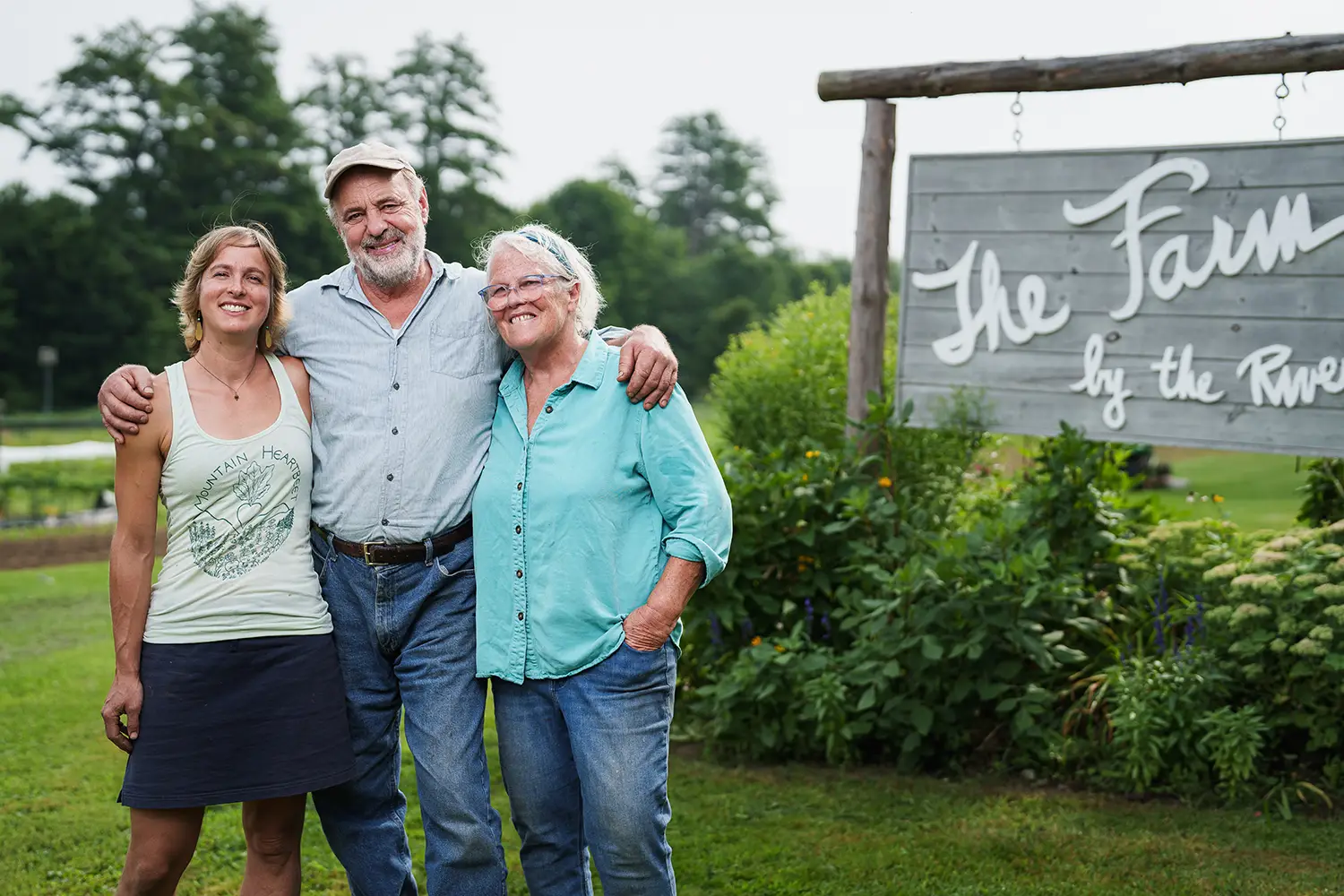

hroughout a 110-year history, Cooperative Extension Services at land-grant universities like UNH have been helping farmers with everything from pests to soil health to crop education and more.
But it’s only recently that Extension began supporting farmers’ mental health.
Twenty years’ worth of data collected nationally shows a troubling truth: the suicide rate among farmers is three and a half times higher than that of the general population, according to the National Rural Health Association.
The causes are many, not the least of which is financial strain brought on by forces beyond a farmer’s control — unpredictable weather, a warming climate, disease and pests.
“If you were to give up farming, those specific stressors would go away. But for many farmers that’s not a consideration, especially for intergenerational and up-and-coming farmers. They don’t want to give it up,” says Klotz.
Still other farmers worry about what will happen to their family farms, as younger generations opt out of the challenging profession: A study published in the American Journal of Industrial Medicine in 2022 shows that almost half of the farmers and ranchers who died by suicide were over 65 years old.
Those factors, along with the compounding of financial, physical, emotional and social stress, can lead farmers to internalize their struggles, generating feelings of shame and hopelessness. Barriers to health care, access to lethal means, stigma associated with mental illness and occupational stressors all are important challenges that have led to the current crisis.
“We both love the farm and farming life. We did whatever we needed to do to support it,” says Eve. She and Bill took over her parents’ farm in 2001 where they have raised sheep, pigs and chickens and have grown perennials, strawberries and raspberries.
In New Hampshire, UNH Extension is stepping up to intervene.
UNH Extension specialists Seth Wilner and Olivia Saunders ’08 have led outreach efforts to provide mental health support to farmers through a program dubbed Farm Strong NH, supported by a subaward of federal funds run through the New Hampshire Department of Agriculture, Markets & Food.
Through Farm Strong NH, farmers have access to therapy sessions at no cost with therapists trained in understanding the unique experiences and needs of farmers.
Farmers working with UNH Extension seeking psychiatric services have been referred to the Lakes Region Mental Health Center in Plymouth. For assistance with navigating resources like insurance, food instability and childcare, farmers can also speak with social workers.
Saunders studied environmental science at UNH and farmed for a few years before joining Extension. She explains that Extension creates space for farmers to come together to talk with one another — to forge friendships, learn from each other and even commiserate about challenges.
“Sometimes a colleague is experiencing similar things as you, and talking to them about that can be therapeutic. So, we’re trying to foster more of that community practice between farmers. Just knowing that your neighbor is also like, ‘Yeah, we’re having a hard time with this wet weather,’ or whatever it may be. Sometimes that can be really reassuring to an individual.”
She acknowledges that most farmers at some point struggle with financial pressure. “It’s really economically stressful to run an agricultural business, and that stress just carries through your whole life and how you are with your employees. … It can affect your decision-making abilities,” she says.
To help farmers manage their stress, Extension has implemented several programs, including connecting farmers with licensed therapists like Eve Klotz.
Because mental health is closely related to the business side of farming, Farm Strong NH goes beyond therapy and social work support. The program has offered legal assistance, conflict resolution services, tax and financial planning, and peer-to-peer networks, including a network specifically for queer farmers and a network for Black, Indigenous and people of color (BIPOC) communities.
Farming as a Way of Life
Klotz acknowledges that some people from non-farming families may have a difficult time understanding why farmers pursue such a demanding lifestyle. They might ask, “Why are you doing this to yourself?”
As someone who has farmed for most of her life, she has direct insight to the “why.” Born in Maryland, Klotz moved to New Hampshire at age 13 when her parents, Albert and Helen Varrieur, bought The Farm By The River in Effingham in 1964. Her father was an engineer and inventor. One of his inventions was a thermometer for regulating a heating system for greenhouses.
Klotz completed her bachelor’s degree in English and was invited to do a teaching fellowship with the department, but life directed her down a different career path. After having her first child with husband Bill ’74, she went to work for a family planning agency in a mental health capacity.
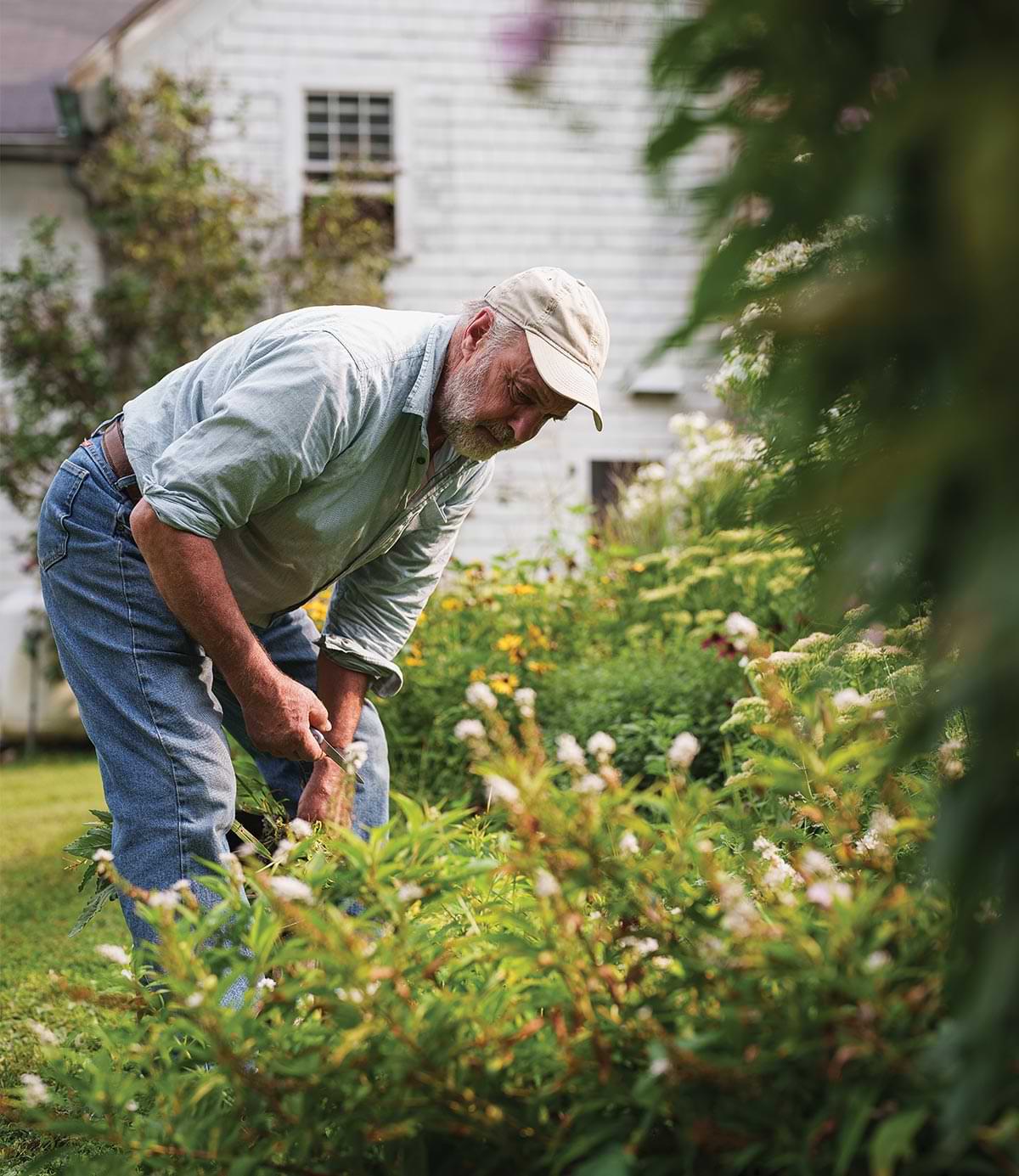
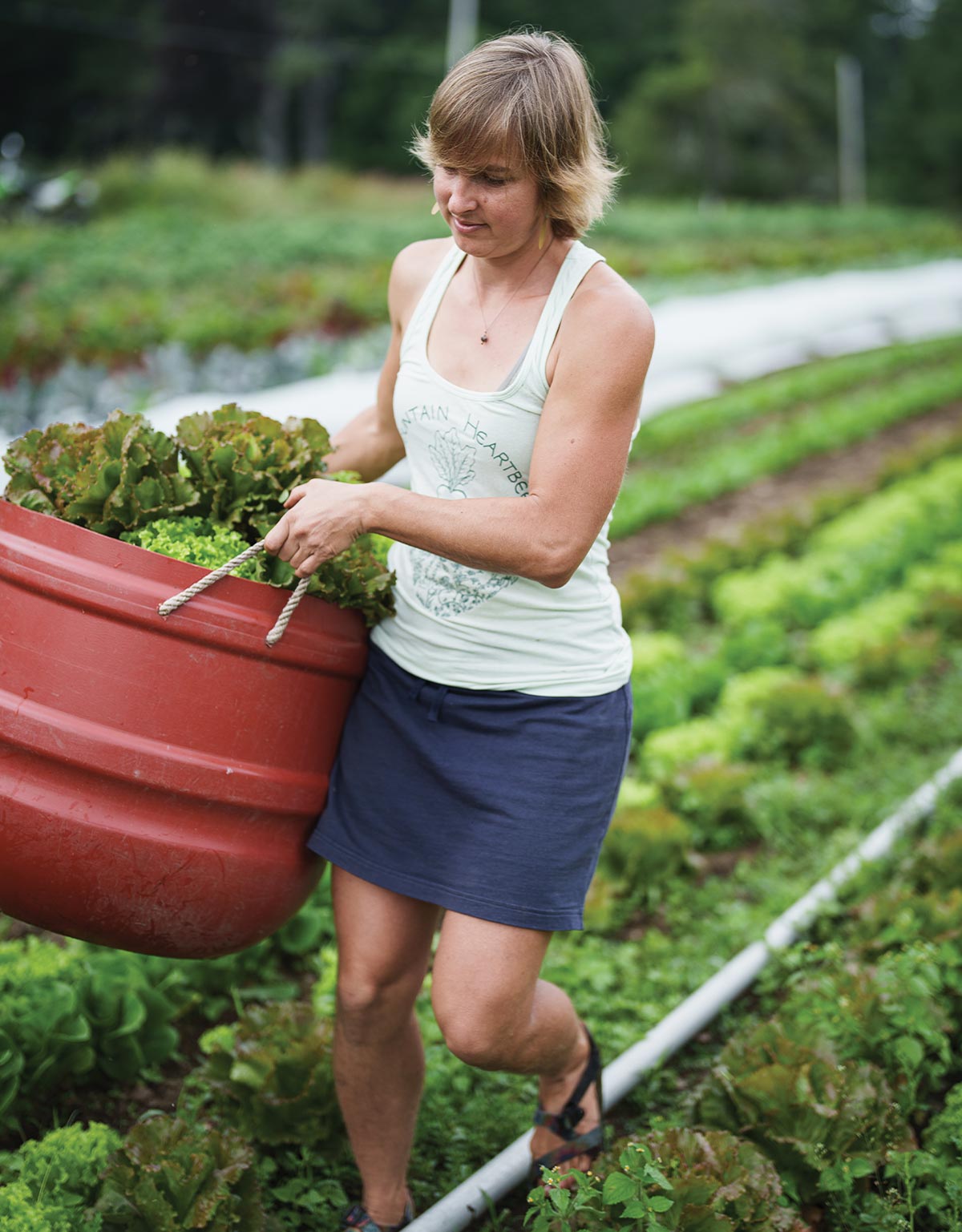
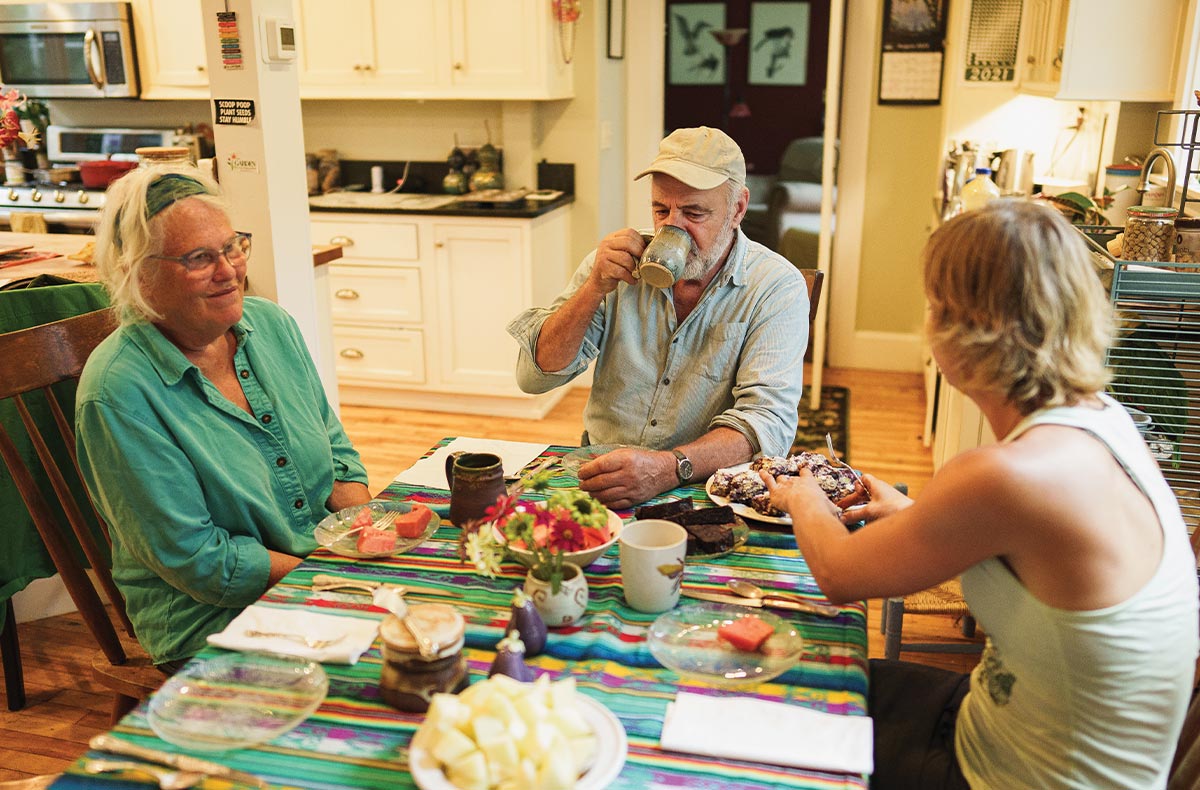
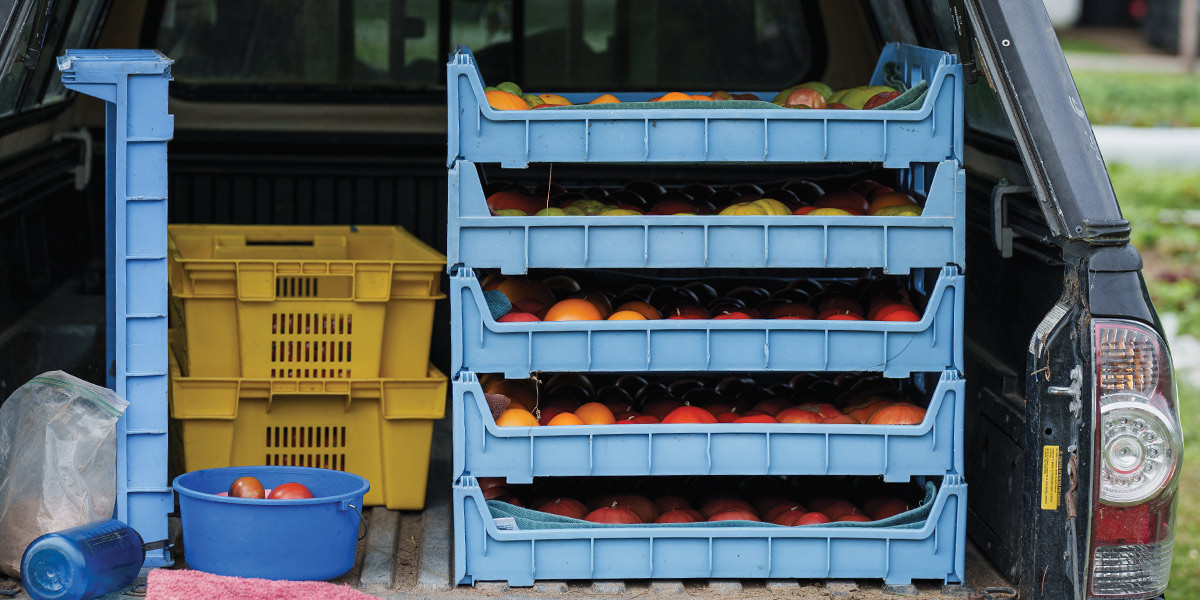
She and Bill took over her parents’ farm in 2001 where they have raised sheep, pigs and chickens and have grown perennials, strawberries and raspberries.
Bill Klotz runs his own landscaping, farm caretaking and maintenance business, and he is a master gardener — a program also offered through UNH Extension that trains volunteers to share their love and knowledge of gardening with the public.
“I’ve never bought a chicken egg from the store,” says Eve Klotz. “We both love the farm and farming life. We did whatever we needed to do to support it.”
 It’s really economically stressful to run an agricultural business, and that stress just carries through your whole life and how you are with your employees. … It can affect your decision-making abilities.”
It’s really economically stressful to run an agricultural business, and that stress just carries through your whole life and how you are with your employees. … It can affect your decision-making abilities.”Eve Klotz ’83 ’99G
But, she admits, it’s a big farmhouse with property that requires a lot of maintenance. Neither of her two children (Alexander ’06 and Timothy ’11) wish to take over the farm.
“That’s sad for us,” she says, her voice softening.
Klotz now finds herself at a crossroads, navigating many of the same challenges that she helps other farmers with through therapy. What should they do with the farm? How will they downsize? What will life be like without the connection to this special place alongside the Ossipee River?
They have already sold their sheep. Physically, taking care of them just got to be too much work.
They also lease some of their land to farmer Joanne Ducas ’05, who studied environmental science at UNH. Ducas operates an organic vegetable CSA called Mountain Heartbeet Veggies from the farm, and sells her produce through local farmers markets and restaurants. Both Bill and Eve provided mentorship to Ducas and let her lease the land free of charge for the first seven years so that Ducas could get her business up and running.
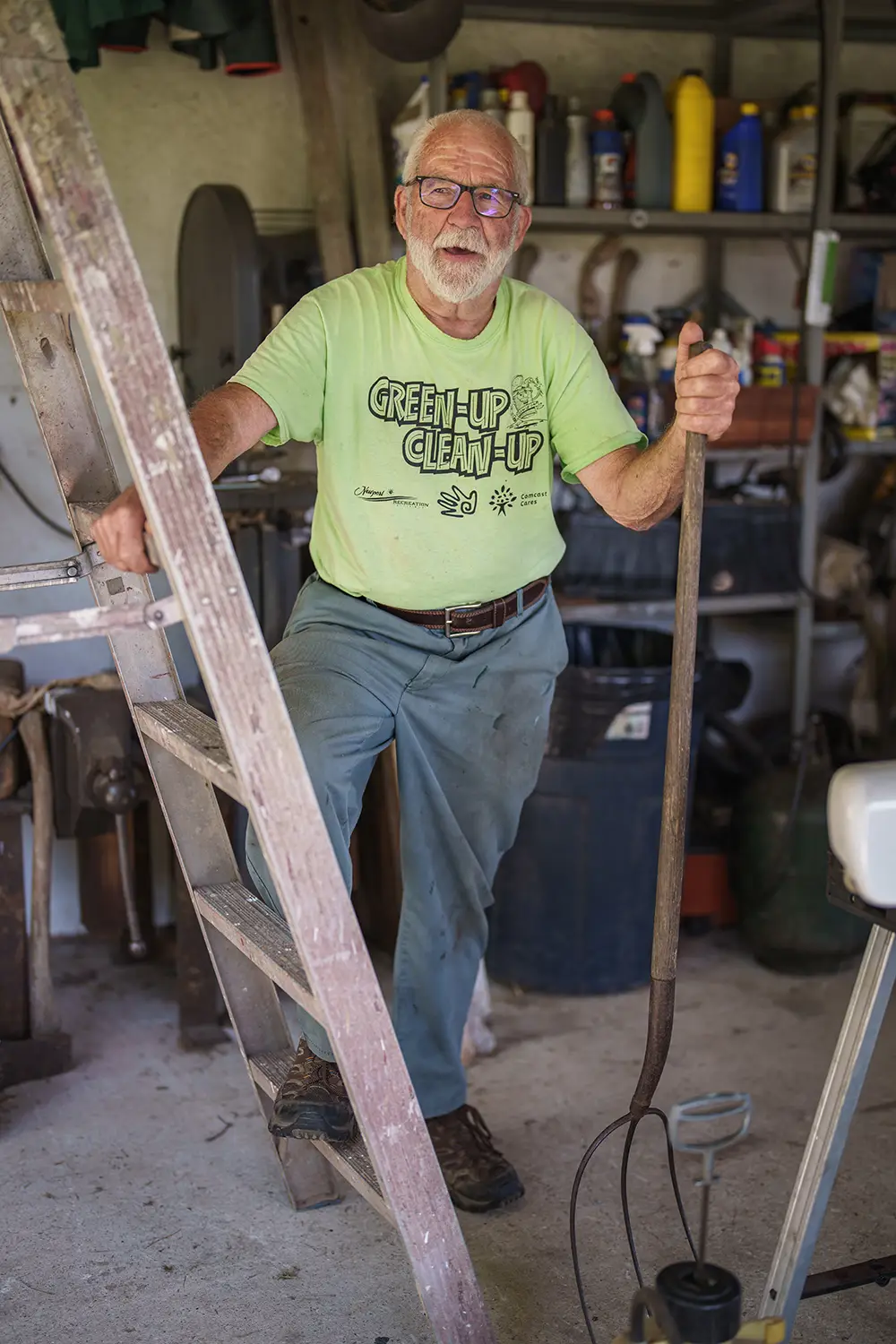
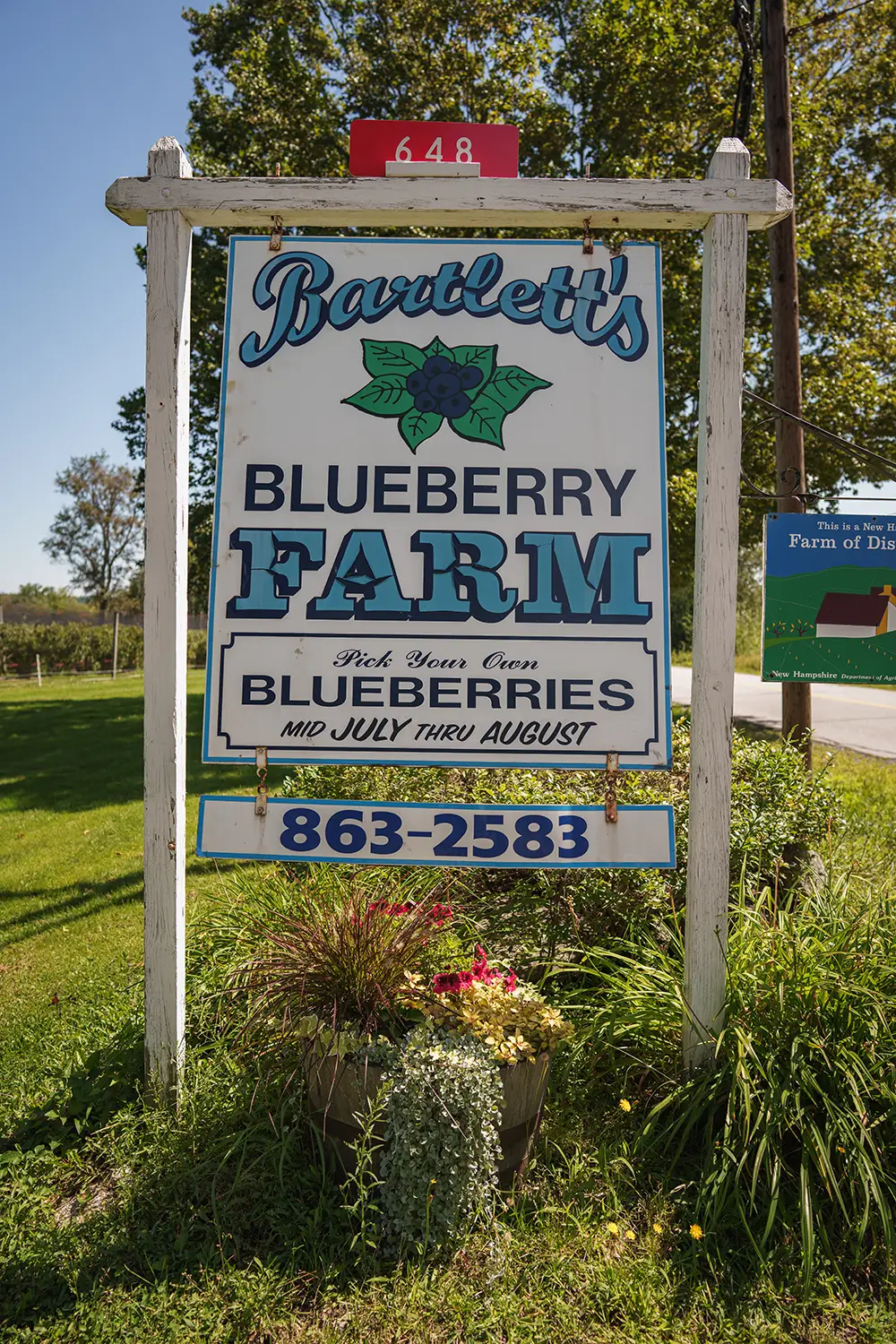
Learning What Can Be Controlled and What Can’t
Speaking from his family’s blueberry farm in Newport, Bartlett looks out at Mount Sunapee. “To me, a rainy day is tough, especially if we’re open for picking,” he says, calling the very wet 2023 summer season “an uphill battle.”
Bartlett’s parents, Bill and Heidi Bartlett, started a pick-your-own highbush blueberry business, which he is working to take over with his wife, Courtney. Bartlett lives seasonally in New Hampshire to help manage the farm; then he, his wife and their daughter head out west to Montana for the fall and to Costa Rica for the winter.
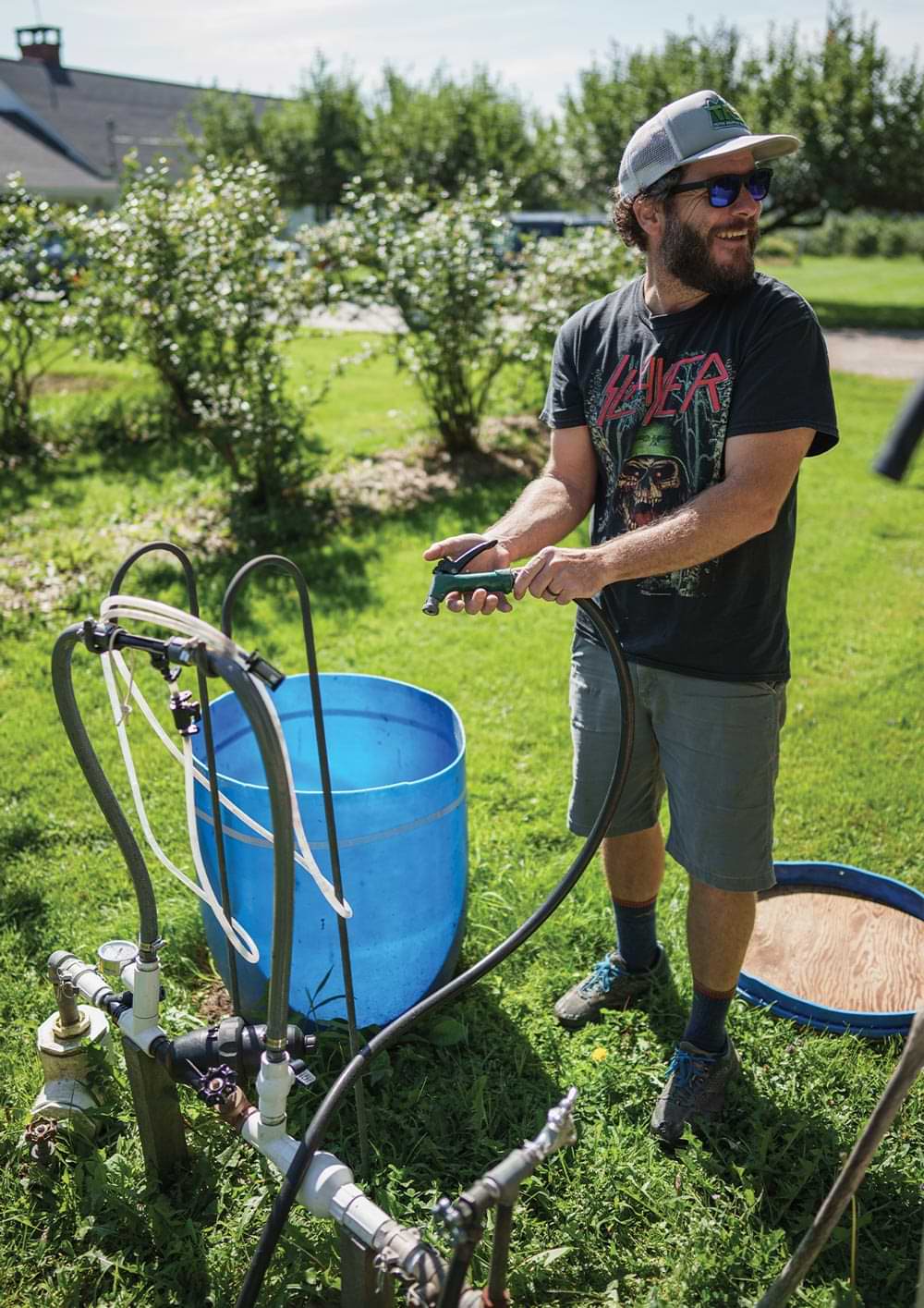

Some of Bartlett’s early blueberry blossoms were damaged, but setbacks are something he’s learned to manage, especially with help from therapy sessions provided through the Farm Strong NH program.
One strategy he finds particularly useful is realizing that there are some things that farmers simply can’t control. Much of farming, it turns out, is about acceptance.
“Listening to the rain pounding off the roof of the house — there is nothing you can do about it. You just have to deal with what you’re given. …Or if you have a beautiful crop and then you have a three-minute hailstorm — well, it’s all been damaged, there’s nothing there — can’t worry about it anymore. When there is nothing to be done any further, that brings me a lot of calm, because I know it’s truly out of my hands.”
 There’s sometimes this predisposed notion that if you’re talking to someone then there’s something ‘wrong’ with you. That’s 100% not the case.”
There’s sometimes this predisposed notion that if you’re talking to someone then there’s something ‘wrong’ with you. That’s 100% not the case.”Pete Bartlett ’06, farmer
Bartlett studied outdoor education and wilderness therapy. After graduating from UNH he embarked on several adventures in the western U.S., including working for a residential wilderness treatment program for boys and as an adaptive ski instructor, so he acknowledges that he has been more familiar with therapy than other farmers might be.
Seeing therapy transform lives was all the encouragement he needed to sign up for the free sessions provided through Farm Strong NH.
Bartlett wants to reassure farmers that there isn’t any shame associated with seeking out help. “There’s sometimes this predisposed notion that if you’re talking to someone then there’s something ‘wrong’ with you. That’s 100% not the case.”
He finds it comforting to talk with someone who is not involved in the issues that cause him stress and who can look at situations objectively.
“As a society, we’re recognizing the need for better mental health at all ages, and that everyone from school-aged kids through our senior population can benefit from getting help with it. For me, it’s about acknowledging that the stress is there and real, but not permanent,” says Bartlett. “I’ve learned to understand that things are always going to work out in the end, and that’s saved me.”
‘It’s Preventative Maintenance’
Sprague comes from a multigenerational farming family in Plainfield, New Hampshire. He helps manage Edgewater Farm, located along the alluvial plains of the Connecticut River, where they grow small fruit, vegetables and cover crops.
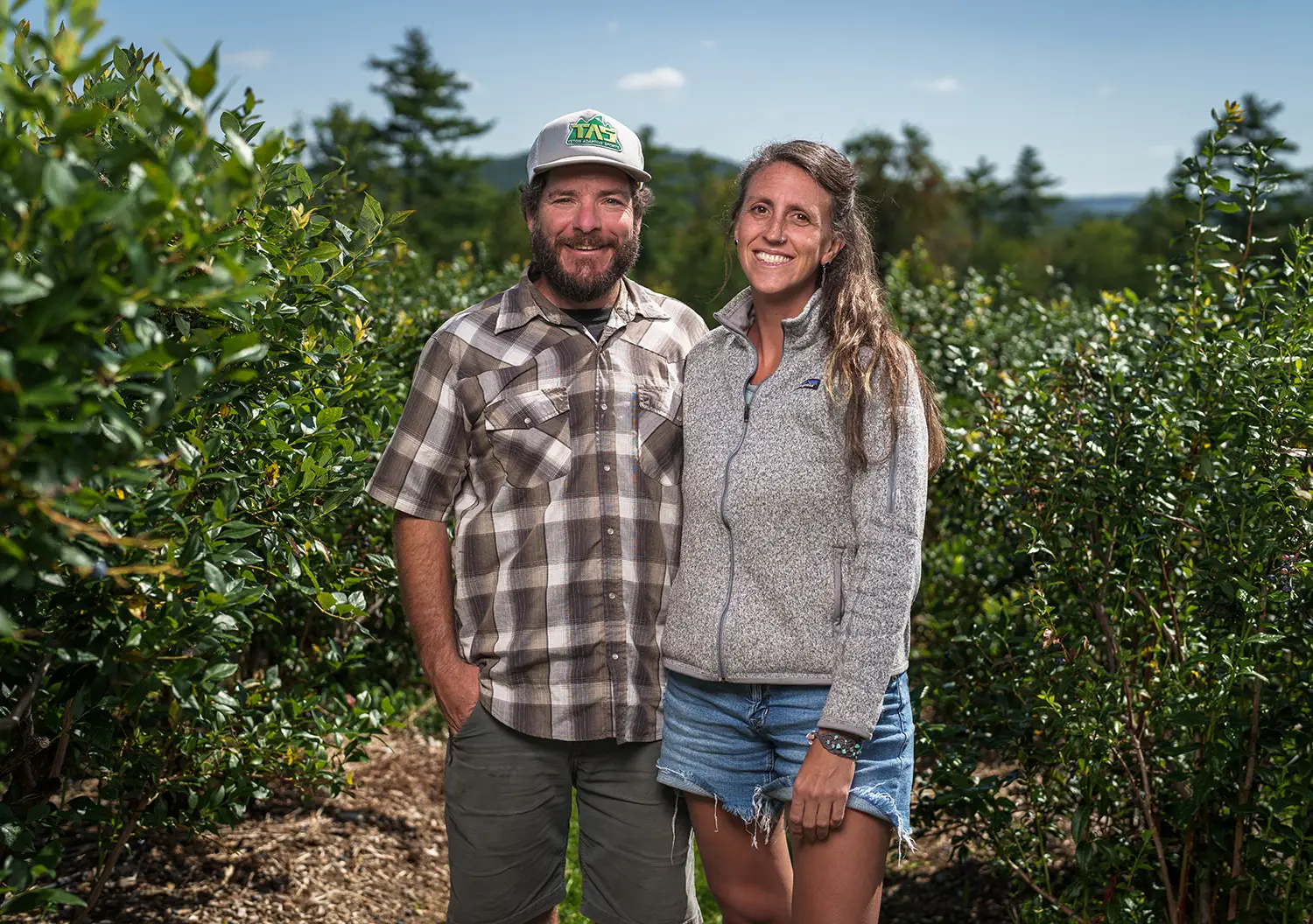
“Extension has been a huge part of the farm — Extension got us growing strawberries in the first place,” he says. Sprague’s parents began growing strawberries at the recommendation of former Extension county agents William Lord and Stan Colby.
These days, Sprague receives farm business support from Seth Wilner, Extension field specialist based in Sullivan County. “Seth is basically like family to us. He’s always helped us with holistic farm management and during times of transition,” says Sprague.
Wilner encouraged Sprague to try out the therapy offered through the Farm Strong NH program. It was the first time Sprague engaged with therapy, and his wife signed up as well.
“A lot of times, farmers want to talk through stuff — they’re going through a tough growing season or something. They want to commiserate, but the trained professionals have a skillset that they can offer. It’s been beneficial to both my farm life and my home life,” he says.
Having the ability to use telehealth by chatting over the phone has been extremely convenient for him. “A farmer can put earbuds in, and it doesn’t matter where they are or what time of day it is,” he says.
Sprague’s advice to other farmers who are curious about therapy, but a bit hesitant?
“I would say don’t wait until everything is in ruins. It’s preventative maintenance. Go talk to somebody, even if you’re feeling slightly upset. Don’t wait until things get terrible.”